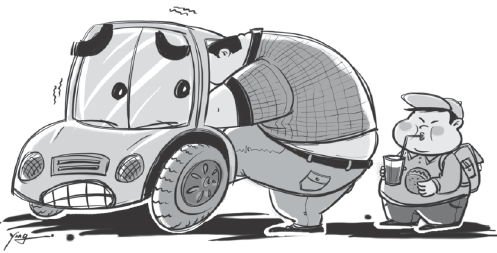Action plan needed to address obesity
Updated: 2016-04-11 08:05
By Cesar Chelala(China Daily)
|
||||||||
 |
| WANG XIAOYING/CHINA DAILY |
Obesity is increasingly, and rapidly, becoming a serious public health problem in China, particularly among children and adolescents. According to Chinese Ministry of Health data, boys aged 6 years are taller and heavier on average now than 30 years ago. Because obesity can have serious consequences on children's health and quality of life, as well as on the country's economy, this is a problem that demands urgent attention. Some doctors have warned that obesity could become China's biggest public health problem in the future.
China and many other developing countries have to bear a "double burden"-widespread under-nutrition, particularly among children in rural areas, and a rapid increase in overweight, obesity and related diseases such as cardiovascular disease, hypertension and stroke, type II diabetes, and certain forms of cancer. Obesity and its related complications cost the government several billion yuan a year.
There are several reasons for the increase in obesity among the younger population. As a result of improving living standards, particularly in the main cities, there has also been an increase in the intake of fast food from food chains such as McDonald's, KFC, Pizza Hut and Starbucks, which offer foods high in salt, sugar and calories from fat. At the same time, there has been a decrease in the consumption of cereals, fruits and vegetables.
In addition, the population as a whole is becoming less active, with reduced levels of walking and cycling and increased use of cars. For example, studies carried out in 2002 and 2012 have shown a direct correlation between ownership of motorized transport and increasing levels of obesity and its consequences in children and adults. Cars have become not only symbols of wealth, but have also led to significantly reduced levels of physical activity.
Another reason for decreased levels of physical activity is the increased use of computers, mobile phones and long hours of watching TV. Many cities lack adequate space for physical activities and there are insufficient sports programs in schools. As a result, there is an energy imbalance between the calories consumed and the calories burnt.
Many experts have indicated the special role that grandparents have in children's obesity. China's one-child policy has created a land of "little emperors" who are specially doted by their grandparents. Since in many families both husbands and wives work, they leave their children in the care of the grandparents, particularly in rural areas.
Traditionally, Chinese people have shown their affection through food. Since in many cases grandparents have personally experienced scarcity of food or even endured famine, they believe that by feeding plenty of calorie-rich foods to their grandchildren they are fulfilling their responsibilities. This many a time puts them at odds with their children's parents and teachers. One study found that children who live with their grandparents eat two additional servings of junk food each week.
Solving the problem of child obesity demands a comprehensive strategy that should include educational, social, media and government policy actions. At the educational level, it is necessary to change school curricula to promote healthy eating and exercising habits, which are crucial to improve students' health.
In addition to teaching healthy lifestyle strategies, it is important to adhere to community-based interventions, such as the National Plan of Action for Nutrition in China that addresses large and diverse populations. Nationwide social programs on public nutrition broadcast through mass media, public information campaigns and community-based interventions have proved useful in combating obesity. Only a comprehensive plan of action can help solve this most difficult problem affecting Chinese children and adolescents.
The author is an international public health consultant and the author of the Children's Health in the Americas and Health of Adolescents and Youth in the Americas.
- Global health entering new era: WHO chief
- Brazil's planning minister steps aside after recordings revelation
- Vietnam, US adopt joint statement on advancing comprehensive partnership
- European border closures 'inhumane': UN refugee agency
- Japan's foreign minister calls A-bombings extremely regrettable
- Fukushima impact unprecedented for oceans: US expert

 Stars of Lijiang River: Elderly brothers with white beards
Stars of Lijiang River: Elderly brothers with white beards
 Wealthy Chinese children paying money to learn British manners
Wealthy Chinese children paying money to learn British manners
 Military-style wedding: Fighter jets, grooms in dashing uniforms
Military-style wedding: Fighter jets, grooms in dashing uniforms
 Striking photos around the world: May 16 - May 22
Striking photos around the world: May 16 - May 22
 Robots help elderly in nursing home in east China
Robots help elderly in nursing home in east China
 Hanging in the air: Chongqing holds rescue drill
Hanging in the air: Chongqing holds rescue drill
 2.1-ton tofu finishes in two hours in central China
2.1-ton tofu finishes in two hours in central China
 Six things you may not know about Grain Buds
Six things you may not know about Grain Buds
Most Viewed
Editor's Picks

|

|

|

|

|

|
Today's Top News
Liang avoids jail in shooting death
China's finance minister addresses ratings downgrade
Duke alumni visit Chinese Embassy
Marriott unlikely to top Anbang offer for Starwood: Observers
Chinese biopharma debuts on Nasdaq
What ends Jeb Bush's White House hopes
Investigation for Nicolas's campaign
Will US-ASEAN meeting be good for region?
US Weekly

|

|









